Five concerns that the FY2024 budget fails to address
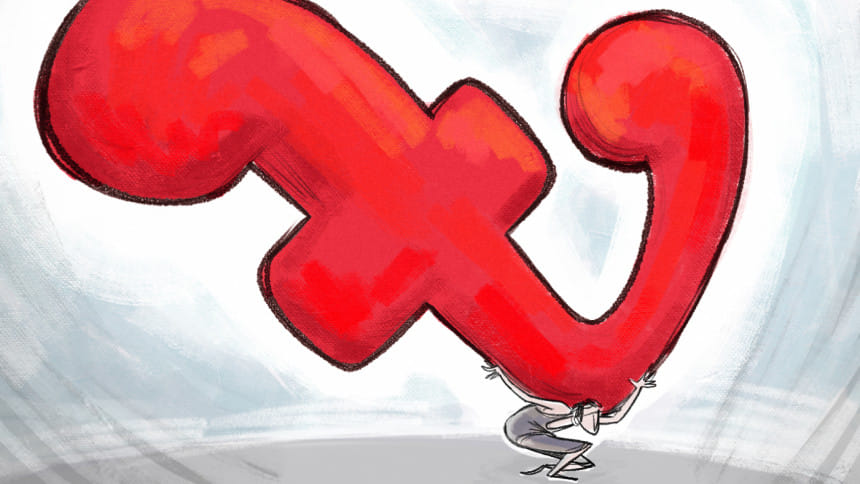
In light of the economic hardships Bangladesh has been going through, there were certain expectations from the national budget of 2023-24 fiscal year. But the proposed budget has been disappointing in that regard, seeing as it has failed to address some major economic concerns at present.
Key macroeconomic targets detached from reality
The FY2024 budget lacks consideration of the existing economic reality and the trend of the country's economic performance in FY2023. The outgoing fiscal year has undoubtedly been challenging for the economy as there is pressure from both domestic and external sources, including the shrinking fiscal space due to low growth in domestic resource mobilisation, excessive dependence on bank borrowing to cover budget deficits including borrowing from the central bank, depreciating external sector balance and foreign exchange reserves, volatility in the dollar exchange rate, and, most importantly, high prices of essentials leading to the erosion of the people's purchasing power.
Unfortunately, these aspects were not recognised while making projections of key economic indicators that determine the performance of the economy. For example, the GDP growth target has been set at 7.5 percent in FY2024. This is much higher than the revised estimate for FY2023, which was brought down to six percent from 7.5 percent in the revised budget.
Investment is a vehicle of growth. In this case, while the public investment to GDP ratio has been kept close to that of FY2023, the expectation for private investment is set too high. In FY2024, private investment-GDP ratio is projected to reach 27.4 percent from 21.8 percent. To achieve this growth, an additional Tk 404,097 crore will be required for the increased private investment, which is a 41.8 percent increase in nominal terms. There is no change in incremental capital output ratio (ICOR) that can boost this growth. Private sector credit growth, which is required for private investment, has been set marginally higher (15 percent) than that of FY2023. Indeed, private investment has been hovering around 24 percent of GDP for many years. How this spectacular improvement with this ICOR and rate of private sector credit growth is possible within a year is unclear.
Projections for the external sector have also been done in the same manner, ignoring the performance of FY2023. Growth of export, imports and remittances have been set at 12 percent, 8 percent and 10 percent, respectively. However, during July-May of FY2023, export growth was 7.1 percent and remittance growth was 1.1 percent. The import data available till April 2023 reveals that import growth as of April 2023 was negative at (-) 14.4 percent. Another important component of the external sector, the forex reserves, are estimated to reach $35.8 billion in FY2024, which was set at $34.6 billion in the revised budget of FY2023. As of June 7, 2023, the forex reserves were $29.8 billion. However, the budget does not report on what the net forex reserves are or what the accumulation of external payment arrears is.
Some resource mobilisation measures need consideration
The challenge of domestic resource mobilisation has been a persistent issue in Bangladesh. Narrow tax net, high tax avoidance and large-scale illicit financial flow could not be resolved in the absence of a meaningful reform of the tax system. As per an IMF conditionality, revenue mobilisation should be enhanced by an additional 0.5 percent of GDP in FY2024. Hence Tk 500,000 crore has been projected as revenue in the proposed budget. That is, revenue mobilisation is estimated to grow by 15.5 percent in FY2024. However, given the trend of revenue collection so far in the outgoing fiscal year, there could be a shortfall in collection in FY2023. Given the revenue collection trend till February 2023, the required growth will be more than 39 percent in FY2024. One hopes that this requirement can be reduced during the rest of the ongoing fiscal year. Even then, the growth has to be more than what is projected for FY2024.
On the other hand, reliance on indirect tax, which is not progressive, has been on the rise.
The new Income Tax Act, 2023 has brought significant changes in the definition of "company." The new definition includes educational institutions, NGOs, private foundations, cooperative societies, chambers and associations, societies, micro-credit institutions, government institutions, local authorities, and autonomous bodies. However, the inclusion of some organisations in this definition, including educational institutions and NGOs, is not justified and should be revised. Any additional tax on educational institutions will be passed on to the students. Besides, the NGOs are non-profit organisations. Their contribution to social development including women's empowerment and educational and health services cannot be ignored.
Abysmally low allocation for social sectors
The education budget as a share of the total budget increased slightly, from 10.67 percent in the revised budget of FY2023 to 11.57 percent in the proposed budget of FY2024. It has also increased slightly as a share of GDP – from 1.59 percent to 1.76 percent. However, this is only a meagre amount compared to the needs of the country. The Eighth Five Year Plan states that the education budget should grow from two percent of GDP in FY2019 to three percent of GDP by FY2025.
Though Bangladesh will graduate out of the Least Developed Country (LDC) status in 2026, its average education expenditure as a percentage of GDP during 2016-2022 was the fifth lowest among 41 LDCs.
The case of the health budget is no different. Here again, the allocation for health both as a share of the total budget and GDP has increased only marginally. For example, the allocation for health as a share of the total budget has increased from 4.5 percent in FY2023 to 4.99 percent in FY2024. On the other hand, as a share of GDP, it has increased from 0.67 percent in FY2023 to 0.76 percent in FY2024. The budget allocation on health per person per year increased by only Tk 70 – that is, from Tk 2,158 in FY2023 to Tk 2,228 in FY2024. Because of low public expenditure on health, people have to cover a major part of their health expenses out of their own pockets. This out-of-pocket expenditure for health was 74 percent in 2020 (latest available data). In fact, over the past two decades, this expenditure shows an increasing trend in Bangladesh, whereas out-of-pocket health expenditure shows a declining trend in neighbouring India, Pakistan, Bhutan, Nepal and Sri Lanka.
The need for social safety net programmes (SSNPs) is felt now more than ever in the face of high inflationary pressure. The share of the SSNP budget both in the total budget and GDP has declined. In monetary terms, the increase is only 7.34 percent – lower than the inflation rate. One of the limitations of the SSNP allocation is that many unrelated programmes – such as pension for retired government employees and their families, savings certificate interest assistance and agricultural subsidy – have been lumped with SSNPs. A careful assessment of the classification of SSNPs indicates that the share of social safety compatible programmes, which should be naturally included in these programmes, is on the decline. In FY2010, the share of SSNP-compatible schemes in the total SSNP budget was 62.2 percent, which has come down to 29.2 percent in FY2024. As a share of GDP, too, it has declined from 1.6 percent in FY2010 to 0.7 percent in FY2024. The social safety net budget excluding pension as a percentage of GDP decreased from 2.15 percent in the revised budget of FY2023 to 1.97 percent in the budget for FY2024.
Measures to rein in inflation inadequate
Inflation has been the most important challenge in FY2023 as it has affected the majority of the population – poor, low-income, and lower middle-income households. Wages, on the other hand, have not increased accordingly. According to the budget, inflation is expected to fall drastically to six percent in FY2024. One may recall that in FY2023, inflation was targeted to be 5.6 percent, which was revised upward to 7.5 percent later. Indeed, inflation throughout FY2023 was above nine percent. Using the new base year 2021-22, the government has estimated annual average inflation at 8.8 percent as of May 2023. However, there are very few commensurate measures in the new budget to relieve the inflationary pressure.
Following the demand for a few years, the annual tax-free threshold for personal income has been raised to Tk 3.5 lakh from Tk 3 lakh. For women, elderly, physically challenged, war-wounded gazetted freedom fighters, and third-gender taxpayers, the respective thresholds have been raised as well. This is a welcome move in view of the impact of high inflation on low-income families. But this is not enough. Without more support through fiscal measures, inequality cannot be reduced.
On the other hand, raising the tax-free threshold for personal income will not help many low-income individuals since it mandates the submission of tax returns as proof when accessing a number of government services, which are used by both wealthy and poor individuals. Consequently, even if someone's annual income is below Tk 3.5 lakh, they have to pay a minimum tax of Tk 2,000. This conflicting requirement undermines the very essence of a tax-free income threshold.
There are no concrete measures to reduce the prices of essentials through fiscal measures. As mentioned above, instead of reducing the pressure, some fiscal measures will create pressure on the consumers as some of the fiscal measures will be passed on to the consumers by the producers in the form of higher prices. Allocation for direct support through social safety nets is inadequate. For example, old age allowance has been increased to Tk 600 from Tk 500, allowances for the widow, deserted and destitute women have been raised to Tk 550 from Tk 500. Sadly, at a time of high prices of commodities, allocation for food-related SSNPs has declined by 1.8 percent.
Budget preparation, implementation process should be inclusive
As the budget goes for the final approval before the end of June 2023, one does not know how much of these – and many other – concerns will be addressed in the final version. It has been a long-standing demand that an important national document such as the annual budget should be discussed and debated before it is formulated and approved. This will help design more practical measures based on realistic assumptions. However, there is a lack of interest and enthusiasm among the lawmakers for reviewing and scrutinising this important document. People's voices are supposed to be brought by the public representatives to the national parliament as people elect them to perform such duties. Alas, this has always been neglected.
In the absence of any accountability, the formulation and implementation of the annual budget continues to be a routine exercise. As a result, transparency regarding public expenditure also suffers. The business-as-usual mechanism of preparing and implementing the budget does not hold anyone responsible for not fulfilling the budgetary targets. If the national budget is to be taken seriously by the policymakers, there must be quarterly review of the implementation status to assess the outcome of budgetary measures in addressing the ongoing and emerging challenges.
Dr Fahmida Khatun is executive director at the Centre for Policy Dialogue (CPD). Views expressed in this article are the author's own.

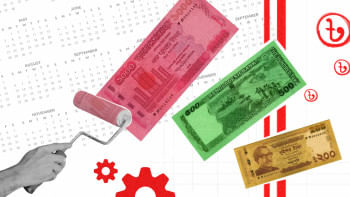
 For all latest news, follow The Daily Star's Google News channel.
For all latest news, follow The Daily Star's Google News channel. 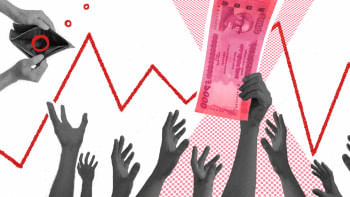
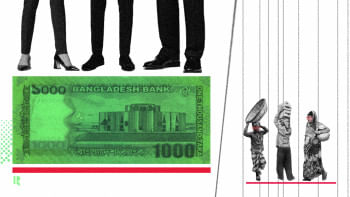
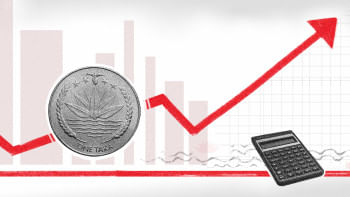






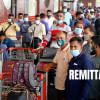
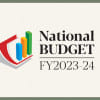

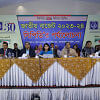



Comments